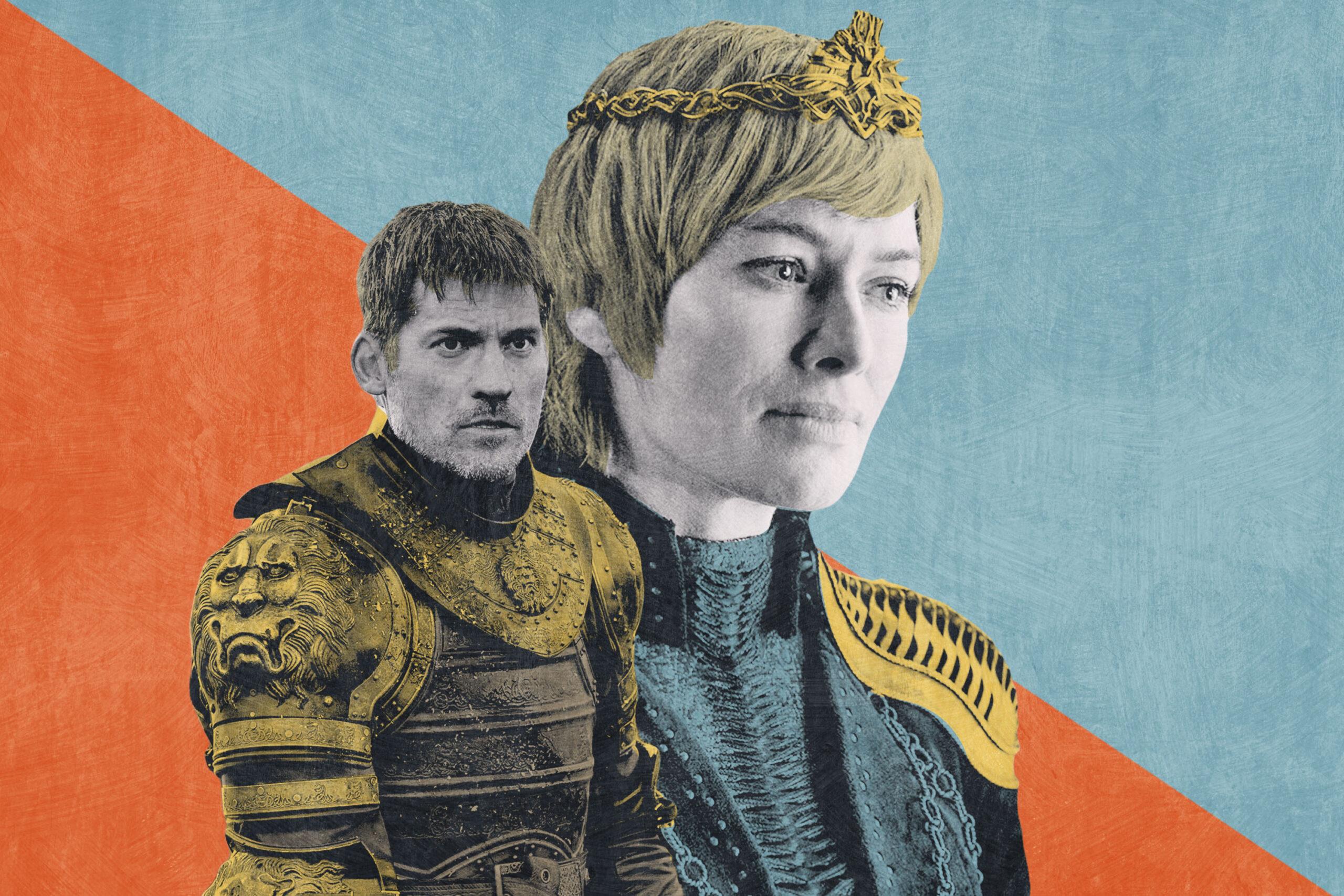‘Game of Thrones’ Loose Ends: How Will Maggy’s Prophecy Continue to Shape Cersei’s Fate?
Who is the younger and more beautiful queen? How does Cersei’s pregnancy change the prophecy’s math? Who is the valonqar? And how does that person’s absence from the show prediction forecast what’s to come?
In 12 days, Game of Thrones will finally return. And 35 days after that, Thrones will end. In less time than it seemingly takes Littlefinger to zip around to every corner of Westeros, showrunners David Benioff and D.B. Weiss will deliver a conclusion to the story George R.R. Martin first introduced 23 years ago—and in that precious time they’ll have to answer half a hundred pressing questions: Who will live? Who will die? Who will tell Jon he’s doing it with his aunt?
Separate from those series-shaping questions are countless smaller but still crucial details that the show may or may not explore in the final season. These are Thrones’ loose ends: the characters, places, events, prophecies, and more that the story has made audiences wonder about over the past seven seasons but has yet to satisfyingly wrap up. In the run-up to the final season’s April 14 premiere, we’ll be digging through these loose ends, looking at why they matter and how they could affect the endgame as we count down the days to Thrones’ long-awaited conclusion.
The Loose End
Besides Bran’s mental travels through space and time, the only flashback in Thrones history came at the start of Season 5. This was a tenuous time for the Lannisters, and for Cersei specifically. Her father, Tywin, the great Lannister lion himself, had just died, slain by her brother Tyrion, whom she believed had also recently killed her first-born son and king, Joffrey. Jaime, her other brother—and Joffrey’s secret father—had failed to protect Joffrey despite his place in the Kingsguard, and he had freed Tyrion from prison before the latter committed patricide. He’d also previously lost his sword hand to boot, and been away from Cersei for years, and their relationship had, at least for the moment, wilted due to all that time apart. (Fun family, this.)
And thus Season 5 begins with a flashback that illuminates much of Cersei’s motivations as a character—and which will help inform her disastrous machinations all throughout the coming season, which eventually get her arrested, charged with treason, and paraded naked through the streets of King’s Landing.
At the age of 10, Cersei and a friend visited a fortune teller in Lannisport named Maggy the Frog, a mystical woman from Essos who answered three questions after tasting Cersei’s blood. Already ambitious and haughty as a young girl, Cersei asked grand questions about her future, and Maggy chilled the young Lannister with her responses:
- Cersei asks if she will wed the prince. Maggy responds, “You will never wed the prince. You will wed the king.”
- Cersei asks if she will be queen. Maggy responds, “Oh, yes. You’ll be queen. For a time. Then comes another, younger, more beautiful, to cast you down and take all you hold dear.”
- Cersei asks if she and the king will have children. Maggy responds, “No. The king will have 20 children and you will have three. Gold will be their crowns, gold their shrouds.”
In the book series, the prophecy contains those pronouncements (mostly; book-Maggy says the king will have 16 children, not 20) plus one more: “When your tears have drowned you, the valonqar shall wrap his hands about your pale white throat and choke the life from you.” Valonqar is the High Valyrian word for “little brother.”
Even without that final book line, though, this prophecy contains great import in the show. Again, it’s the only flashback (non–Bran division), which by itself stands out; its inclusion also runs counter to an informal rule that Benioff and Weiss set for themselves at the outset of the show, at which point they didn’t want to film any flashbacks.
And while its reveal matters a great deal to understanding Cersei’s actions throughout the show—explaining why she’s so hostile to Margaery, for instance, whom Cersei might have believed to be the younger and more beautiful queen in question—it also matters a great deal to Cersei’s future. Which yields a set of questions for this loose end: Who is the younger queen? What does Cersei’s new pregnancy mean in light of her predicted number of children? Who is the valonqar? And does it matter that the books mention that person, but not the show?
Why This Loose End Matters
Some of the items in Cersei’s prophecy have already been satisfied—marrying the king (Robert) and seeing her children die—but more components still require resolution. And of course this multi-pronged loose end still matters; this is a prophecy forecasting death for one of the show’s premier villains. If you’re reading this piece, you’re interested in learning how the rest of Cersei’s arc curves, and seeing as Maggy’s words have shaped her past few decades, it’s reasonable to assume her remaining days will follow that same self-destructive pattern.
How Season 8 Could Address It
It’s important, first, to note just how self-destructive Cersei’s behavior has been in regard to Maggy’s words—and what that reaction says about prophecy at large in the Thrones world. As Tyrion says in A Dance With Dragons, “Prophecy is like a half-trained mule. It looks as though it might be useful, but the moment you trust in it, it kicks you in the head.”
This truism doesn’t stop Cersei from obsessing over and trying to prevent her forecasted future from reaching fruition, though. Instead, she joins a long list of Song of Ice and Fire characters who have faltered because of overinvestment in prophecy; in Cersei’s case, she has actually helped mobilize Maggy’s predictions with her efforts to prevent them. “Maggy the Frog tells Cersei a prophecy,” Martin said when the Season 5 premiere aired, “but could Cersei make it happen through her efforts to avoid it?”
For instance, by reacting so strongly to Joffrey’s death—by forcing Tyrion to a trial, which leads to Oberyn’s death and the Sand Snakes’ desire for revenge—she indirectly causes Myrcella’s. And by conniving against Margaery to try to prevent the “younger and more beautiful” part of the prophecy from manifesting, she sets in motion the series of events that leads to Tommen’s suicide. It’s no coincidence that the haunting shot of Tommen’s death places the smoke rising over the Sept of Baelor’s former location—Cersei’s direct, wildfire-aided handiwork—right in the frame, a visual reminder of who is to blame.
Still, Cersei thinks a proactive approach to her future can stave off the worst predicted parts. In the books, as she angles for Margaery’s imprisonment by the High Sparrow, she thinks, “It was a pity that Maggy the Frog was dead. Piss on your prophecy, old woman.” (Note, too, that Cersei isn’t sure that Maggy is dead; she just assumes because of Maggy’s age. Never lose that overconfidence, Cersei!)
So with that lesson in mind, let’s take the three remaining elements of the prophecy one at a time to see what might be in store in Season 8.
The Rival Queen
First, Cersei has not yet been cast down by a younger and more beautiful queen. She’s thus far fended off some contenders, though. First was Sansa, whom Cersei mistreated from the start. Next was Margaery, a more willing rival, whom Cersei assailed with the most intensity; it is Margaery whom Cersei sees immediately after reflecting on her encounter with Maggy. And in a rather pyrrhic victory Cersei does, with the help of some explosives, prevent Margaery from usurping her power.
But then another younger queen appeared, and this one brought her own explosive-grade weaponry to Westeros. In Daenerys Targaryen, Cersei faces her most formidable rival yet, and Dany is now the obvious candidate to overthrow the Lannister line. It is this possibility that bounced around Cersei’s brain as she charted a treacherous course at the end of Season 7, secretly sending Euron to bring the Golden Company sellswords to Westeros instead of accepting Dany’s offer of a truce while the realm dealt with the Army of the Dead.
This very move illustrates Cersei’s broader issue with interpreting prophecy, as she embraces possible short-term gain without regard for the long-term consequences. It also raises the question of what further horrors Cersei will unleash to try to keep the throne. She’s schemed, she’s killed, she’s betrayed—what more might follow? All those visions of the Red Keep in disrepair that have appeared throughout the show must come from somewhere.
Dany is the favorite, but she’s not Maggy’s only theoretical referent—even if the other candidates’ cases aren’t as strong as the dragon queen’s. Yara Greyjoy is younger than Cersei, though she’s allied with Dany and in Season 6 expressed her desire to command the Iron Islands and nothing more. Arianne Martell, Prince Doran’s daughter, is an option in book-world, but Arianne hasn’t appeared on the show and, like the rest of Dorne, likely won’t in Season 8. Sansa could work, though; after Sansa marries Tyrion, Cersei might have assumed the little dove finished as a contender for the throne—but now, possessed of power and her own self-confidence, Sansa is a dark-horse candidate to end up atop the Iron Throne. Sansa’s gaining vengeance against Cersei years after her torment in King’s Landing would supply a satisfying conclusion to both their arcs.
Her Children
Second, via Joffrey, Myrcella, and Tommen, Cersei has already birthed her three predicted kids—but the show has added some complications here, because Cersei is now pregnant. (It’s possible that she’s faking as some sort of plot, but stage directions from the Season 7 scripts suggest it’s true.) On this topic, Maggy’s prediction included all of Robert’s children, so wouldn’t the same hold true for Cersei as well, meaning she should never have a fourth kid and might in fact die before the pregnancy comes to term?
Well, maybe. Back in Season 1, the show invented a fourth child for her, which already seems to provoke problems with the prophecy. Although book canon says that Cersei and Robert never had a child, twice in Season 1 Cersei discusses a black-haired boy who died young, first with Catelyn and then—to prove it wasn’t a lie—in private with Robert. Yet Thrones producer Bryan Cogman has said it wasn’t a continuity error. “Maggy’s just speaking of the three official kids who lived and were known, etc.,” he told Watchers on the Wall. “The black haired baby was kept quiet.” This explanation makes very little sense in-universe—how could the new king and queen, the continent’s first non-Targaryen rulers in centuries, hide the birth of a royal baby?!—but let’s go with it.
Does that mean Cersei’s current pregnancy could actually produce a child, and as long as it dies quickly and quietly, she won’t run afoul of the prophecy? It’s a possibility with precedent, and would fit with the show’s penchant for gruesome baby deaths.
The Valonqar
And third, no valonqar has yet wrapped hands around her pale white throat and choked the life from her. The identity of the valonqar is widely debated among the Song of Ice and Fire fandom. In Cersei’s mind, at least, there is no debate; she has long believed Tyrion to be the killer in question, and thus has maligned him ever since learning of the prophecy. Yet while Tyrion might kill Cersei in the end—he certainly has the motivation—that result seems too easy, especially when the point of prophecy in this story seems to be that its recipients blunder by misreading its words.
If not Tyrion, Jaime is an obvious candidate. The anointed knight is Cersei’s twin, but she was born first, so he technically would qualify as her younger brother, and in an online poll of fans in 2015, 72 percent of respondents predicted Jaime as the valonqar. In both the books and show, he has soured on Cersei as a sister, lover, and queen, and he converted this feeling into action in the Season 7 finale, leaving Cersei’s side despite her command otherwise and journeying north to join the fight against the White Walkers.
Jaime as the valonqar would bring two long-simmering plot notes full circle. First, pivoting from Kingslayer to Queenslayer to again save the realm would fit his character, and second, using the golden hand Cersei so despises to strangle her would add a tragic note of poetic resonance to the lovers’ final chapter. Moreover, if Jaime turns out to be the culprit, Thrones would further reinforce its lessons about fate. Cersei’s single-minded devotion to preserving her power, and thus preventing her removal by a younger queen, would cause her to inadvertently bring the inevitable might of the valonqar part of the prophecy upon herself. Jaime is thus the best option for this resolution, for reasons of character, plot, and ultimate didacticism.
Yet more characters present themselves as options, because Maggy tells Cersei that the valonqar would kill her, not your valonqar. Could that vaguer description mean the reference isn’t to Tyrion or Jaime, but rather any younger brother? If so, Euron could be the valonqar and betray Cersei when he returns from Essos with the Golden Company, or Jon could be the valonqar, or Bran, or plenty of other characters who are all younger brothers. (Sandor Clegane is also a prime valonqar candidate in the books, but like with Arianne Martell, that opportunity has likely passed in the show.)
There could also be a gendered translation error, like the one in the “Prince That Was Promised” prophecy that Dany, Melisandre, and Missandei discuss in Season 7. If valonqar means younger sibling more broadly, rather than brother specifically, the range of potential killers would widen, adding the likes of Arya Stark—who very much wants to kill Cersei, the leading remaining member of her kill list—to the pool. The likes of Dany and Sansa, too, are younger siblings; perhaps one of that duo is both the younger and more beautiful queen and the valonqar, though one wonders why Maggy would phrase her readings in such a fashion if that were the case.
But the fact that the valonqar line doesn’t appear in the show complicates such predictions, especially because the showrunners included every other key Maggy line in their re-telling of Martin’s words. Did they omit it to try to disguise future events, if they thought it would provide too strong a signal and ruin a future surprise? If Jaime is the killer, maybe. But book readers have debated the meaning of that line for years, and even with Jaime’s status as favorite, it’s not as if he’s the only character to whom the line could apply.
The line’s omission from the show could instead suggest that the valonqar future will apply only in the books and not the show, and Cersei will meet some other end entirely. Many fans were surprised she survived even through Season 7; if she’s already stuck around this long, maybe she’ll finish the show still alive, too. Maybe her treachery will prove a winning strategy, and she and Euron will share the Iron Throne and make happy, violent babies together. Or maybe she’ll just die in some other fashion, or finish the show’s run somewhere between the extremes of “seated on the Throne” and “dead.”
Jaime as the valonqar still makes the most narrative sense and packs the most emotional punch, but that prophetic line’s omission glares and points to a world of other possible outcomes, even atop the already multitudinous outcomes Maggy’s words could foreshadow. Trying to disentangle the strands of prophecy turns out the same way for Thrones fans as it does for Thrones characters, apparently: The moment we think we have it figured, a giant throbbing pain appears in the temple, the result of a half-trained metaphorical mule kicking us square in the head.
Disclosure: HBO is an initial investor in The Ringer.

